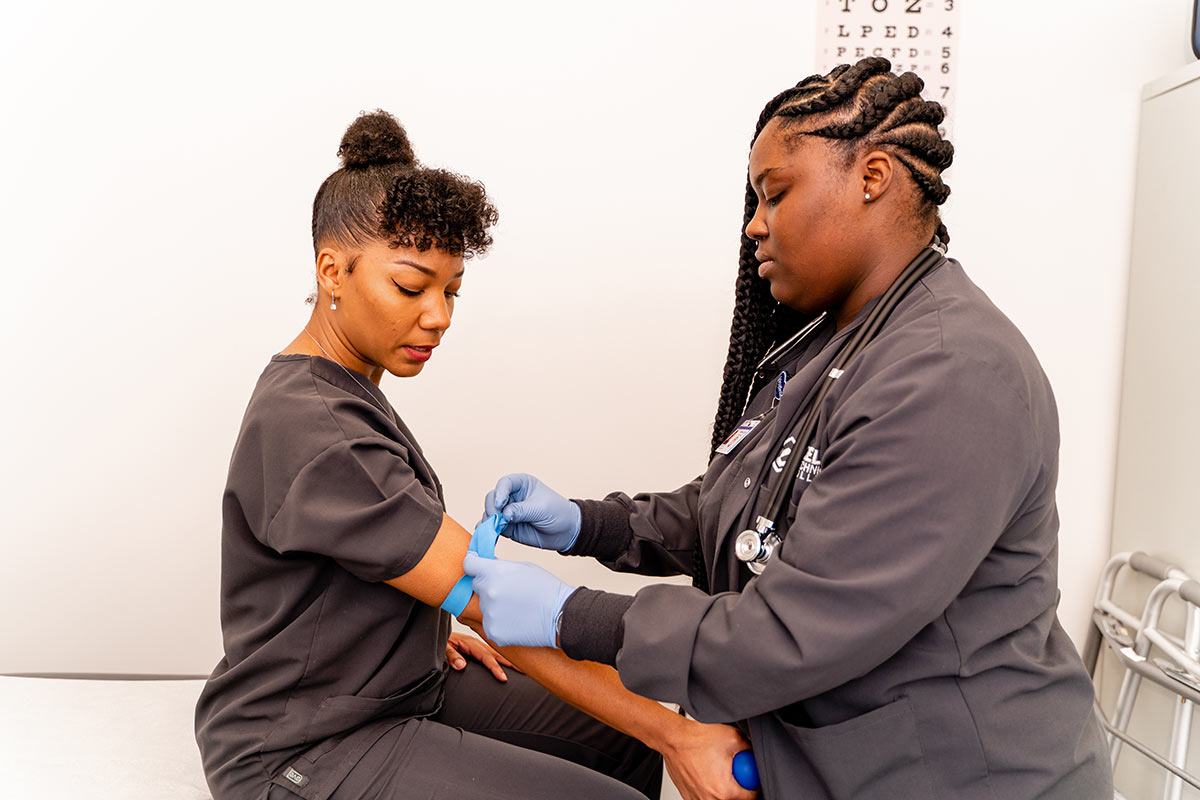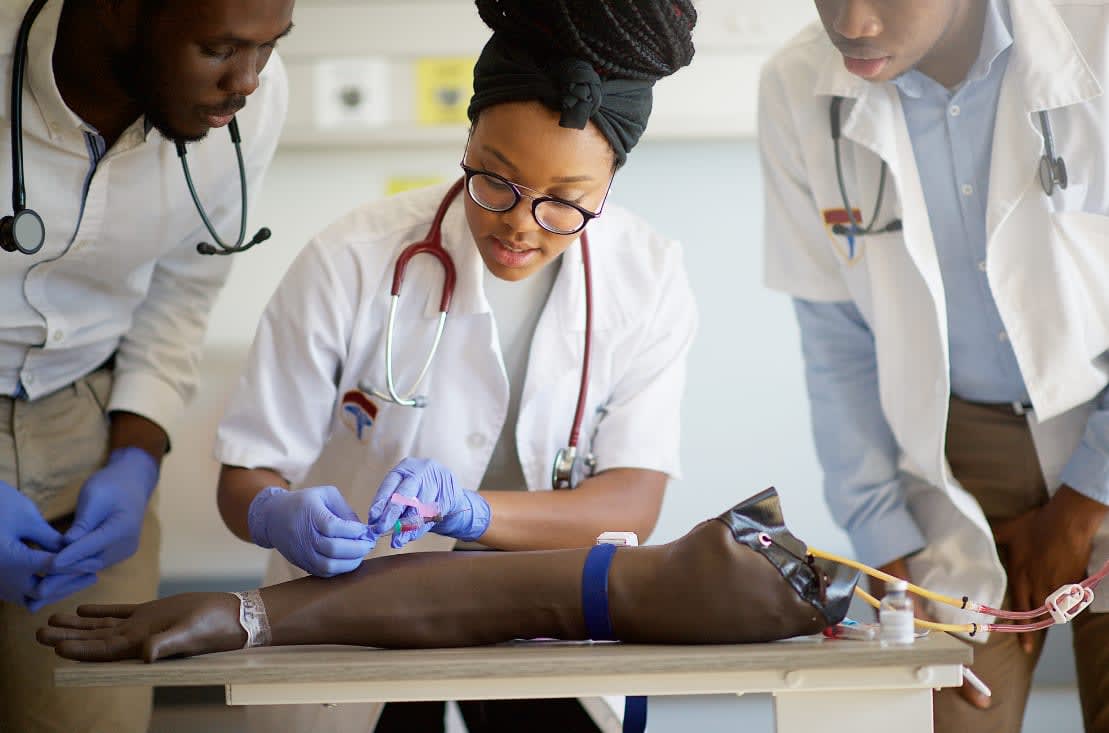Essential Details About Starting a Phlebotomy Training Course Today
Essential Details About Starting a Phlebotomy Training Course Today
Blog Article
The Path to Accreditation: Recognizing the Phlebotomy Training Training Course Trip and Its Relevance
As you think about the path to qualification in phlebotomy, it is very important to recognize the role you'll play in healthcare. Your training will cover necessary abilities, from blood collection techniques to patient communication. Each part of the program prepares you for the challenges ahead. What exactly does the journey entail, and why is qualification so essential for your future profession? Allow's explore these concerns additionally.

The Duty of Phlebotomists in Medical Care
Phlebotomists play an important role in the healthcare system, working as the vital web link between people and crucial diagnostic testing. You'll execute blood draws, ensuring examples are gathered properly and safely. Your expertise assists in diagnosing medical problems, checking health, and assisting therapy choices.
In your everyday communications, you'll require to develop trust fund with individuals, making them really feel comfortable during what may be a demanding experience. You're liable for identifying and managing examples very carefully to prevent contamination or errors, which could affect examination outcomes.
Past this, you'll usually work alongside physicians and registered nurses, interacting important info about patients' problems. By understanding your skills, you contribute meaningfully to patient care, making you a vital part of the clinical group.
Overview of Phlebotomy Training Programs
When exploring phlebotomy training programs, you'll locate different kinds created to fit various routines and discovering styles. Each program helps you develop essential abilities like blood collection and client communication. Comprehending these alternatives is essential to picking the best course for your profession.
Kinds Of Training Programs
A number of kinds of training programs are readily available for those aiming to end up being competent in phlebotomy. You can pick from certificate programs, which typically last a few months and concentrate on essential abilities. There are additionally diploma programs that give a more complete education, usually lasting as much as a year. If you're looking for a much deeper understanding, an associate level in an associated field could be the ideal fit. On-line courses supply flexibility for those stabilizing job or household commitments, allowing you to study at your own rate. Additionally, some healthcare facilities and facilities use on-the-job training programs, offering practical experience while you learn. Whatever path you pick, each program intends to outfit you with the essential abilities for an effective phlebotomy profession.

Secret Skills Established
Grasping phlebotomy needs a set of crucial skills that are created through comprehensive training programs. You'll discover technological skills like proper capillary selection, needle insertion, and blood collection techniques. These hands-on techniques ensure you can do procedures safely and efficiently. In addition, interaction abilities are essential; you'll require to connect with people, discuss treatments, and put them secure. Understanding composition and physiology is critical, also, as it helps you locate veins and understand the body's action to blood attracts. You'll obtain understanding of safety and security procedures and infection control, guaranteeing you preserve a sterilized setting. Each of these abilities is essential for your success as a certified phlebotomist, making you a beneficial asset in any healthcare setting.
Secret Components of a Phlebotomy Training Course
In a phlebotomy course, you'll concentrate on vital subjects that lay the foundation for your future profession. You'll take part in hands-on training that permits you to use what you've found out in real-world settings. Both the core educational program and functional experience are crucial for your success as a phlebotomist.
Core Curriculum Review
While pursuing a phlebotomy training program, you'll run into a curriculum made to outfit you with fundamental abilities and understanding. Phlebotomy school. This curriculum generally includes composition and physiology, concentrating on the blood circulation system and recognizing blood elements. You'll additionally find out about different kinds of blood collection approaches, consisting of venipuncture and capillary leak techniques
In addition, infection control and security procedures are crucial elements, guaranteeing you know how to maintain a clean and sterile atmosphere. You'll study patient communication, emphasizing communication and compassion, which are important for relieving individual anxiousness. Moral and lawful factors to consider will certainly be attended to, preparing you for real-world duties. This foundational expertise will certainly allow you to stand out as a phlebotomist and provide quality care in scientific settings.
Hands-On Training Experience
Getting hands-on experience is an indispensable part of your phlebotomy training course. This functional training allows you to apply what you have actually learned in a real-world setup, enhancing your skills and self-confidence. Phlebotomy Training Course.
Additionally, you'll obtain the opportunity to engage with clients, which is crucial for establishing your communication skills. This combination of technological effectiveness and social skills is critical for your success as a licensed phlebotomist. Ultimately, hands-on training is where concept fulfills technique, strengthening your expertise and readiness for qualification.
Certification and Licensing Requirements
Prior to you can begin your profession in phlebotomy, it is vital to recognize the accreditation and licensing demands that differ by state. A lot of states call for phlebotomists to hold a qualification from an identified organization, such as the National Phlebotomy Association or the American Society for Professional Pathology. These certifications usually entail passing an exam that evaluates your knowledge and skills in the field.
In enhancement to qualification, some states have specific licensing requirements. You may need to finish a specific variety of hours in scientific practice, send evidence of training, or go through a history check. It is essential to research your state's regulations to ensure you fulfill all needed requirements.
Remaining informed about these demands not only assists you protect a position but likewise improves your credibility as an expert. By fulfilling these requirements, you'll be well on your method to a successful profession in phlebotomy.
Hands-On Training and Practical Experience
Hands-on training and practical experience are essential components of your phlebotomy education and learning, as they allow you to use theoretical expertise discover this in real-world circumstances. During your training, you'll participate in supervised venipuncture, discover appropriate techniques, and end up being acquainted with different blood collection devices. This straight involvement is crucial for constructing your self-confidence and sharpening your skills.
You'll function closely with seasoned experts that can guide you with the subtleties of client interaction and sample handling. Each practice not just enhances your understanding however likewise prepares you for the fast-paced environment of health care setups.
Additionally, many programs incorporate medical rotations, enabling you to experience diverse settings, from hospitals to outpatient facilities. This exposure helps you adjust to different challenges and client needs, ensuring you're well-prepared for your future function. Welcome these possibilities, as they're necessary to becoming a skilled and caring phlebotomist.
Challenges Encountered During Training
While gaining hands-on experience is necessary, it's essential to recognize the obstacles that can develop during your phlebotomy training. In addition, mastering the abilities needed for blood attracts takes technique; you may have a hard time with technique originally.
Time management can likewise be a difficulty, as balancing concept, sensible sessions, and individual commitments can feel intimidating. You may face varying finding out rates amongst your peers, leading to sensations of self-doubt if you believe you're falling back. Adjusting to the different individualities of teachers can be tough, as each might have an i was reading this unique mentor style.
Identifying these barriers beforehand can prepare you for success and help you establish durability throughout your training journey.
Profession Opportunities After Accreditation

As you gain experience, you might also take into consideration specializing in areas like pediatric or senior citizen phlebotomy, accommodating specific person demands. Some phlebotomists choose to advance their careers by coming to be lab professionals or seeking further education and learning in healthcare fields.
Additionally, your qualification can cause functions in training or supervising new phlebotomists, enabling you to share your knowledge. With the health care industry constantly expanding, your skills will certainly always be in need, paving the way for a steady and satisfying profession. Embrace the chances waiting for you!
Regularly Asked Concerns
What Is the Regular Period of a Phlebotomy Training Course?
Phlebotomy training courses generally last around 4 to 8 weeks. You'll take part in hands-on technique, classroom guideline, and on-line knowing. Finishing this training prepares you for qualification and a satisfying occupation in health care.
Are Online Phlebotomy Courses Available?
Yes, on the internet phlebotomy programs are available. They supply flexibility and ease, enabling you to research at your own rate. Just verify the program is recognized to my blog meet accreditation needs and obtain beneficial skills for your job.
Just How Much Does Phlebotomy Training Normally Cost?
Phlebotomy training normally costs in between $700 and $2,500, depending on the program and location. You need to consider variables like course length, consisted of materials, and hands-on experience when selecting the ideal training for you.
What Prevail Prerequisites for Phlebotomy Training?
Common prerequisites for phlebotomy training frequently include a high college diploma or GED, immunizations, and a history check. Some programs may additionally need fundamental medical care expertise or certifications, guaranteeing you're gotten ready for hands-on training.
Can I Function While Completing My Phlebotomy Training?
Yes, you can function while completing your phlebotomy training. Several trainees balance work with their studies, but make sure to manage your time effectively to assure you fulfill both work and training commitments successfully.
Report this page